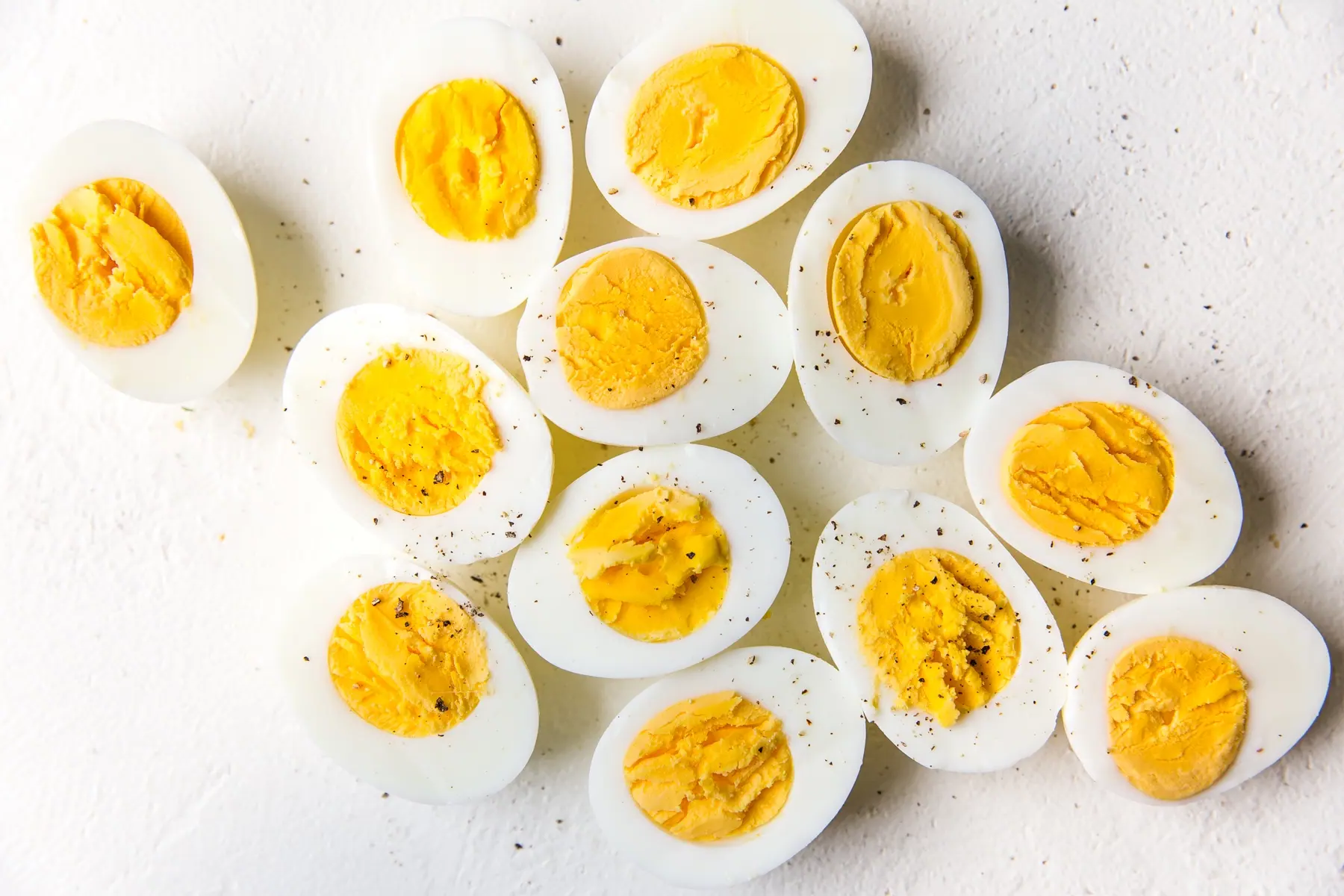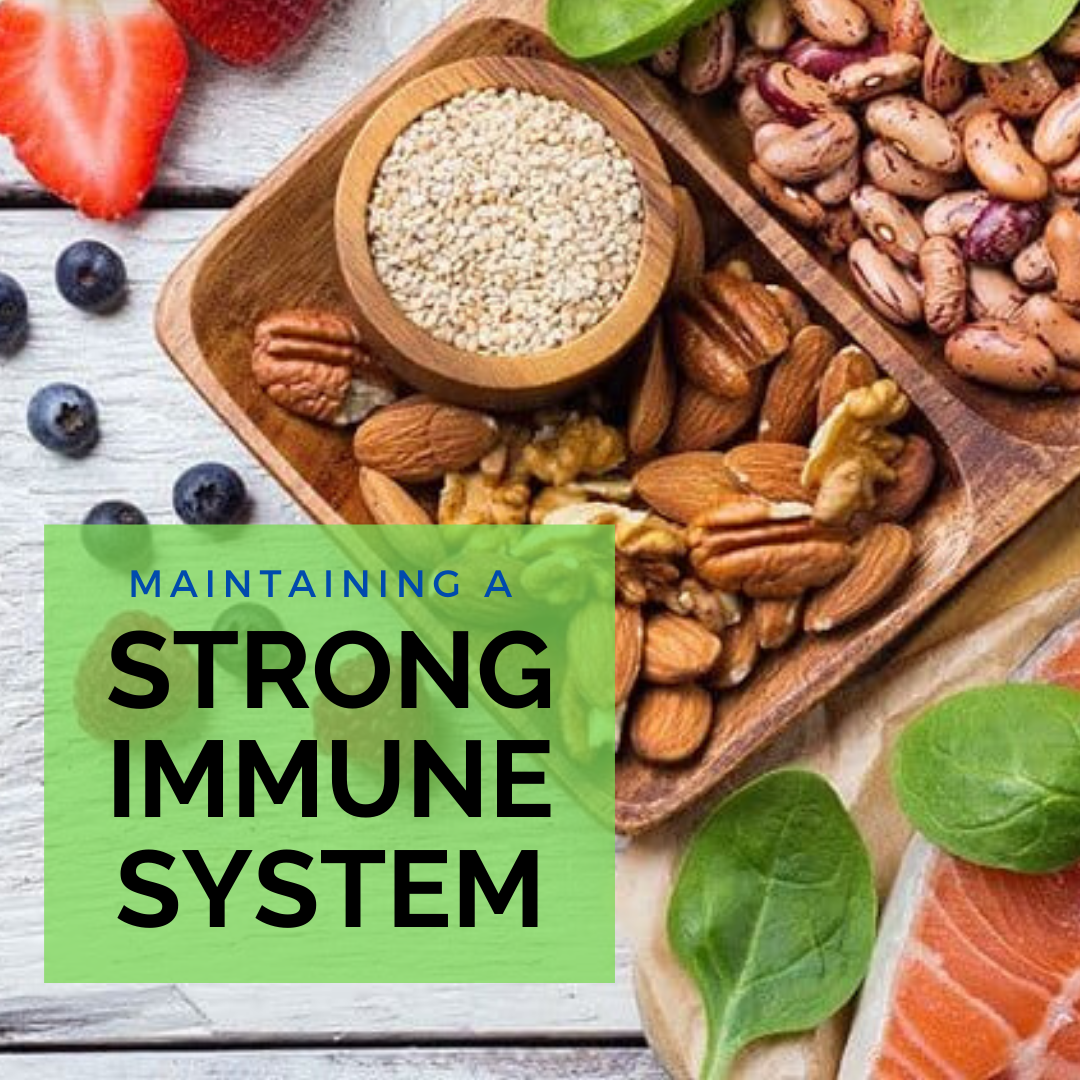

Is it healthy to eat whole eggs? Are egg whites a better option? Here, we review egg and egg white nutrition and highlight the latest research.
Egg and Egg White Nutrition: Macronutrients, Vitamins, and Minerals

By weight, whole eggs are mostly water! Considering only the solids, a large egg provides 6 g of protein and 5 g of fat, with minimal amount of carbohydrate. Most of the protein is in the white (4 of 6 grams), and all the fat is in the yolk (5 of 5 grams).

With the exception of vitamin C, eggs are vitamin rich. The highest nutrient density is in the yolks. As expected, the vitamins that are fat-soluble (A,D,E,K) are exclusively found in the yolks since there’s no fat in egg whites. Eggs are also relatively high in phosphorous, calcium, and potassium.[1]
Egg and Egg White Nutrition: Micronutrients
Choline
Beyond vitamins and minerals, eggs are a good source of choline. This essential nutrient is a structural element of our body’s cell membranes and a precursor molecule for acetylcholine. Think of acetylcholine as the CEO neurotransmitter in the parasympathetic nervous system, communicating signals for muscle control, blood vessel dilation, and regulation of heart rate. Choline also plays a role in memory, mood, and other brain and nervous system functions. Although our bodies can make small quantities of choline, most of it must be consumed through diet. One egg contains 147 mg choline and the US Recommended Nutrient Intake (RNI) for healthy adults is 425 mg/day for females 550 mg/day for males.[2] If you aren’t an egg eater, other lean protein sources of choline are beef top round (117 mg in 3 oz) and soybeans (107 mg in 1/2 cup).
Carotenoids
Egg yolk is a highly bioavailable source of plant pigment carotenoids lutein and zeaxanthin (on average 292 and 213 micrograms/yolk, respectively). These pigments also provide the yolk its yellow color. Hue will depend on what the hen is eating. Chicken farmers sometimes will add other natural pigments such as beta-carotene and marigold to chicken feed to make yolks darker.
Lutein and zeaxanthin accumulate in the retina. Multiple observational and interventional trials indicate lutein has beneficial impact on diseases of the eye,[3] preventing or even improving both age-related macular degeneration (AMD), the leading cause of blindness and vision impairment. Lutein may also have positive effects towards other conditions, research results have been equivocal for total favorable effects on human health and there is no recommended dosage. As an alternative, it’s possible to supplement lutein or consume it from plant-based foods – for example kale, spinach, or broccoli. Bioavailability from plant sources may be reduced,[4,5,6] but this may also depend on co-consumed foods.

You may have noticed yolks take on a green hue when they’ve been sitting around for a bit or are overcooked. Totally normal and safe. It’s iron sulfide – a reaction between the iron in the yolk with hydrogen sulfide gas generated from the egg protein during cooking. Hydrogen sulfide is also responsible for the stink….
Are Whole Eggs “Bad”? – Eggs and CVD Risk
Historically, consumption of high cholesterol foods was directly implicated in increased risk of of cardiovascular disease (CVD). Pre-2013, the American Heart Association/American College of Cardiology Dietary Guidelines for Americans recommended limiting dietary cholesterol to <300mg/day. For reference, one egg contains ~187mg of cholesterol.
More recent revision of guidelines did not again bring forward this recommendation. Available evidence shows no appreciable relationship between consumption of dietary cholesterol and serum cholesterol. The available evidence suggests that within the context of actual dietary patterns, replacing foods high in saturated fat (which typically also contain more cholesterol) with foods higher in polyunsaturated fats (PUFAs) are expected to produce greater reductions in LDL cholesterol than reducing dietary cholesterol intake alone. Therefore, cholesterol specifically is not a nutrient of concern for overconsumption.[7,8,9]
In this context, eggs are an outlier as they are high in cholesterol yet low in saturated fat. In the most recent prospective cohort study,[10] moderate egg consumption (1 egg/day) is not associated with overall cardiovascular disease risk. If dietary cholesterol is a concern, evidence supports reduction in consumption of ultra-processed meats and fried foods, combined with addition of more dietary fiber from vegetables and fruits as more beneficial action than elimination of egg yolks.
Of course, the danger in study interpretation in support of, or against whole egg consumption is generalization over large populations, which may not be relevant at the individual level. If you have specific concerns, consult your physician.
Egg Protein – Strength and Body Composition
Eggs are a high-quality protein source, providing all essential amino acids (EAAs). They’re also highly digestible, achieving a top score of 1 per Protein Digestibility Corrected Amino Acid Scoring (PDCAAS). With respect to total essential amino acid (EAA) concentration, egg protein is comparable to human skeletal muscle.[11]

Is there a “winner” in terms of eating whole eggs versus egg whites? Depends on your goals, but if you’re a resistance training individual pursuing strength gains, whole eggs *may* provide a slight advantage.
Although dietary amino acid availability is a major correlate to post-exercise muscle protein synthesis (MPS), research conducted by Sawan [12] and van Vliet [13] highlights that there are impactful non-protein variables that impact MPS anabolic signaling. The observed MPS response with whole egg consumption versus protein-equated egg white consumption indicates compounds in the yolk have a synergistic effect. Although a 2020 study [14] indicated egg whites and whole eggs similarly support muscle hypertrophy provided total protein intake is maintained, more recent research by Bagheri [15] found that their whole egg eating test subjects demonstrated increased quadriceps and handgrip strength and a reduction in body fat % compared to their protein equated egg-white eating group.
If strength is your goal, there’s no need to avoid eating whole eggs and sticking only to whites. Provided you have enough total protein in your diet, whole eggs appear to be just as beneficial (if not more beneficial) to your progress. If your primary goal is weight loss, the primary factor to consider is maintaining a calorie deficit. Egg whites contribute calories from protein, whereas whole eggs contribute calories from protein plus more energy-dense fats. Limiting the amount of egg yolks can help keep total calories and fat macros in check.
Quick Egg Recipes and Egg Substitutes
Although freshly cooked eggs usually taste the best, it’s no issue to store cooked eggs in the fridge for a week. They can readily be reheated in the microwave. Here are a few ideas for meal prep or quick cooking:
- Meal Prep: Egg & Sausage Breakfast Bites
- Protein Egg Crepes
- 2-Minute Microwave Scrambled Eggs (great with spinach, peppers, and/or low-fat cheese)
Many baking recipes require eggs, which is a bit trickier if you’re vegan. Here are a few alternatives with the macronutrient comparison:
| kcal | Protein | Carbs | Fats | |
|---|---|---|---|---|
| 1 Whole Egg | 78 | 6.0 | 0.6 | 5.0 |
| EQUIVALENT to 1 EGG IN BAKING: | ||||
| 1/4 cup unsweetened applesauce | 25 | 0.0 | 7.0 | 0.0 |
| 1 tbsp. soy protein + 3 tbsp. water | 20 | 4.3 | 0.0 | 0.3 |
| 1 tbsp. ground flax seed + 3 tbsp. water | 40 | 1.5 | 2.0 | 3.0 |
| 2 tbsp. ground chia seed + 3 tbsp. water | 30 | 1.0 | 2.5 | 1.0 |
I hope you found this review of egg and egg white nutrition valuable! Reach out anytime if you have questions.
Ready to focus on your performance and body composition? Contact me to discuss nutrition coaching.
[1] Rehault-Godbert, S.; Guyot, N.; Nys, T., The golden egg: nutrition value, bioactivities, and emerging benefits for human health, Nutrients, 11, 684, (2019).
[2] Institute of Medicine, Food and Nutrition Board. Dietary Reference Intakes: Thiamin, Riboflavin, Niacin, Vitamin B6, Folate, Vitamin B12, Pantothenic Acid, Biotin, and Choline. Washington, DC: National Academy Press; 199
[3] Buscemi, S.; Corleo, D.; et al., The effect of lutein on eye and extra-eye health, Nutrients, 10(9), 1321, (2018).
[4] Handelman, G.J.; Nightingale, Z.D.; et al., Lutein and zeaxanthin concentrations in plasma after dietary supplementation with egg yolk, Am J Clin Nutr., 70(2), 247, (1999).
[5] Chung, H-Y.; Rasmussen, H.M.; Johnson, E.J., Lutein bioavailability is higher from lutein-enriched eggs than from supplements and spinach in men, J Nutr., 134(8), 1887, (2004).
[6] Eisenhauer, B.; Natoli, S.; et al., Lutein and Zeaxanthin-Food Sources, Bioavailability and Dietary Variety in Age-Related Macular Degeneration Protection, Nutrients, 9(2), 120, (2017)
[7] Eckel R.H.; Jakicic, J.M.; et. al., 2013 AHA/ACC guideline on lifestyle management to reduce cardiovascular risk: a report of the American College of Cardiology/American Heart Association Task Force on Practice Guidelines [published corrections appear in Circulation. 2014;129:S100–S101 and Circulation. 2015;131:e326]. Circulation. 2014; 129 (suppl 2):S76–S99. doi: 10.1161/01.cir.0000437740.48606.d1
[8] Carson, J.S.; Lichtenstein, A.H.; et al., Dietary Cholesterol and Cardiovascular Risk: A Science Advisory From the American Heart Association, Circulation, 141(3), 2019.
[9] Mensink R., Effects of saturated fatty acids on serum lipids and lipoproteins: a systematic review and regression analysis. Geneva, Switzerland: World Health Organization; 2016.
[10] Drouin-Chartier, J-p.; Chen, S.; et. al., Egg consumption and risk of cardiovascular disease: three large prospective US cohort studies, systematic review, and updated meta-analysis, BMJ, 4(368), 513, (2020).
[11] van Vliet, S.; Burd, N.; van Loon, L.J.C., The skeletal muscle anabolic response to plant- versus animal-based protein consumption, J Nutr., 145(9), (2015)
[12] Sawan, S.A.; van Vliet, S.; et. al., Whole egg, but not egg white, ingestion induces mTOR colocalization with the lysosome after resistance exercise, Am J Physiol Cell Physiol., 315(4), C537, (2018).
[13] van Vliet, S.; Shy, E.L.; et al., Consumption of whole eggs promotes greater stimulation of postexercise muscle protein synthesis than consumption of isonitrogenous amounts of egg whites in young men, Am J Clin Nutr., 106(6), 1401, (2017).
[14] Bagheri, R.; Moghadam, B; et.al., Comparison of whole egg v. egg white ingestion during 12 weeks of resistance training on skeletal muscle regulatory markers in resistance-trained men, British Journal of Nutrition, 124(10), 1035, (2020).
[15] Bagheri, R.; Hooshmand, M.; et. al., Whole egg vs. egg white ingestion during 12 weeks of resistance training in trained young males: A Randomized Controlled Trial, J Strength Cond Res., 35(2), 411, (2021).


